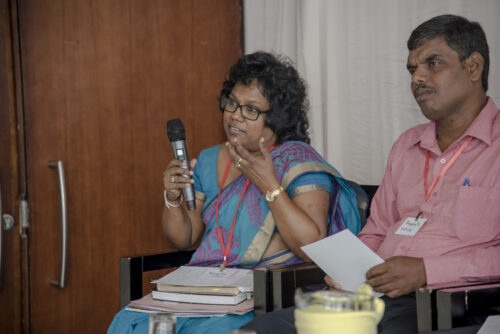Sri Lankans Collaborate to Combat Ocean Plastic Pollution

Renowned for its beautiful beaches and UNESCO sites, Sri Lanka (population 21.4 million) welcomed around 2.33 million tourists in 2018. An estimated half a million Sri Lankans depend on tourism directly, while two million rely on it indirectly.
However, plastic waste coming from neighboring countries and from Sri Lanka’s own consumption is a growing problem. Research shows Sri Lanka contributes as much as 640,000 metric tons of plastic waste to the oceans annually, making it the world’s fifth largest polluter as measured by total mass of mismanaged plastic debris. (See Jameck et al, Plastic Waste Inputs From Land Into The Ocean)
USAID’s Municipal Waste Recycling Program (MWRP) in Sri Lanka is currently supporting seven projects through grants to local Sri Lankan organizations. The national government is finalizing the Sri Lanka Policy for Waste Management and the private sector is looking for ways to mobilize an economy out of waste.
In December 2019, Sri Lankan grantees from USAID’s MWRP program, private sector, and government representatives came together todiscuss challenges and lessons learned from their efforts in combating ocean plastic waste.
What’s working
During the discussions in December it was clear that there are multiple promising business models coming out from the collaboration of the MWRP grantees and private sector that can be replicated across the country. For example, MAS Holdings, a Sri Lankan company, in partnership with MWRP grantee Eco Spindles, uses recycled plastic bottles to produce synthetic yarn which is used to make sports clothing. Local hotels are making efforts to change their waste management practices. The Movenpick Hotel is using paper laundry bags instead of plastic bags, and Jetwing hotels are creating their own water treatment plants, bottling their water in glass bottles, and changing their small shampoo bottles for big dispensers.
Ongoing challenges
Although USAID grantees, private sector partners, and the government of Sri Lanka are doing promising work to reduce plastic waste, there are still outstanding challenges:
Creating an economy out of waste is a popular statement among the private sector, and a complicated challenge around the world.
Food producers are looking for profitable ways to change their packaging, looking for ways to pack yogurt and other products in compostable or at least recyclable containers. However, further development is needed to make non-plastic or recyclable plastic containers profitable for businesses.
Grocers have said that food packaging is very dependent on plastic and face difficulty in finding compostable or recyclable alternatives. In the community “the Point Pedro Urban Council”, banana leaves were used to pack lunches, but banana leaves are season-dependent thus creating another challenge.
In addition, recyclers’ earnings are depending on the fluctuating value of the recycled materials, and there is not enough infrastructure to ensure that waste separation is well processed.
Educating communities so that reduce, reuse, and recycle is their way of life. NGOs in Sri Lanka recognize that community participation is key in combating plastic pollution. Success is often found when communities are involved from the conception of the project, however workshop participants acknowledged that there is still a lot to do to create public awareness. The other aspect participants discussed was the fact that from increased awareness and knowledge to behavior change the journey is complex and not linear. They noted that when the locality approves regulations that require alternatives to plastic, such as banana leaves, this becomes an important enabler of behavior change. Such regulations need strong enforcement to be effective.
Opportunities ahead
Continuing active collaboration among NGOs, government, and the private sector. The workshop participants agreed that they need each other to succeed. One private sector representative stated, “we cannot do it alone.” Government representatives engaged in conversations with the MWRP grantees and expressed interest in learning more about the grantees’ and private sector’s work. Grantees recognized that they are more successful when they work hand in hand with government and the private sector. The Ceylon Chamber of Commerce agreed to be the convener for future meetings to ensure that this collaboration happens.
Creating a National Policy Framework with different policies and regulations existing in Sri Lanka was openly expressed as a need in the USAID Workshop. Any policy framework ought to be common and inclusive.

